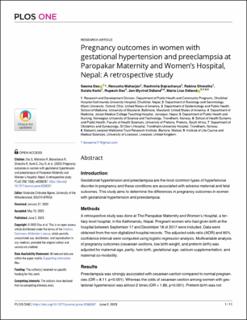| dc.contributor.author | Das, Seema | |
| dc.contributor.author | Maharjan, Renusha | |
| dc.contributor.author | Bajracharya, Rashmita | |
| dc.contributor.author | Shrestha, Rabina | |
| dc.contributor.author | Karki, Sulata | |
| dc.contributor.author | Das, Rupesh | |
| dc.contributor.author | Odland, Jon Øyvind | |
| dc.contributor.author | Odland, Maria Lisa | |
| dc.date.accessioned | 2023-11-08T08:36:47Z | |
| dc.date.available | 2023-11-08T08:36:47Z | |
| dc.date.created | 2023-06-16T09:38:26Z | |
| dc.date.issued | 2023 | |
| dc.identifier.citation | PLOS ONE. 2023, 18 (6), e0286287-?. | en_US |
| dc.identifier.issn | 1932-6203 | |
| dc.identifier.uri | https://hdl.handle.net/11250/3101282 | |
| dc.description.abstract | Introduction
Gestational hypertension and preeclampsia are the most common types of hypertensive disorder in pregnancy and these conditions are associated with adverse maternal and fetal outcomes. This study aims to determine the differences in pregnancy outcomes in women with gestational hypertension and preeclampsia.
Methods
A retrospective study was done at The Paropakar Maternity and Women’s Hospital, a tertiary level hospital, in the Kathmandu, Nepal. Pregnant women who had given birth at the hospital between September 17 and December 18 of 2017 were included. Data were obtained from the non-digitalized hospital records. The adjusted odds ratio (AOR) and 95% confidence interval were computed using logistic regression analysis. Multivariable analysis of pregnancy outcomes (cesarean sections, low birth weight, and preterm birth) was adjusted for maternal age, parity, twin birth, gestational age, calcium supplementation, and maternal co-morbidity.
Results
Preeclampsia was strongly associated with cesarean section compared to normal pregnancies (OR = 8.11, p<0.001). Whereas the odds of cesarean section among women with gestational hypertension was almost 2 times (OR = 1.89, p<0.001). Preterm birth was not significantly associated with gestational hypertension but was associated with preeclampsia (OR = 3.39, p<0.001). Gestational hypertension and preeclampsia were not associated with low birth weight.
Conclusion
In Nepal, women who develop preeclampsia seem at higher risk of having adverse pregnancy outcomes than women with gestational hypertension. These findings should be considered by national health authorities and other health organizations when setting new priorities to improve pregnancy outcomes. | en_US |
| dc.language.iso | eng | en_US |
| dc.publisher | Public Library of Science | en_US |
| dc.rights | Navngivelse 4.0 Internasjonal | * |
| dc.rights.uri | http://creativecommons.org/licenses/by/4.0/deed.no | * |
| dc.title | Pregnancy outcomes in women with gestational hypertension and preeclampsia at Paropakar Maternity and Women's Hospital, Nepal: A retrospective study | en_US |
| dc.title.alternative | Pregnancy outcomes in women with gestational hypertension and preeclampsia at Paropakar Maternity and Women's Hospital, Nepal: A retrospective study | en_US |
| dc.type | Peer reviewed | en_US |
| dc.type | Journal article | en_US |
| dc.description.version | publishedVersion | en_US |
| dc.source.pagenumber | e0286287-? | en_US |
| dc.source.volume | 18 | en_US |
| dc.source.journal | PLOS ONE | en_US |
| dc.source.issue | 6 | en_US |
| dc.identifier.doi | 10.1371/journal.pone.0286287 | |
| dc.identifier.cristin | 2155151 | |
| cristin.ispublished | true | |
| cristin.fulltext | original | |
| cristin.qualitycode | 1 | |

